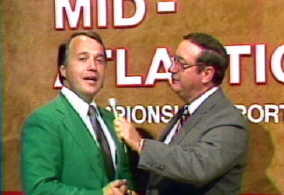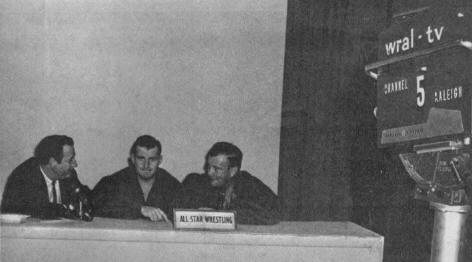|
Chappell:
I think most Mid-Atlantic fans think of
Bob Caudle
and
David
Crockett as THE announcing team in the area.
Caudle:
Johnny Weaver worked with me for that extended period in the
80s, but it really was
David
and I for most of the time.
Chappell:
Describe what it was like working with
David
Crockett.
Caudle:
It worked out well.
David
was real easy to work with…he had a lot of excitement about him.
(laughs)
David
could get really excited about things, but he was very easy to work
with. I didn’t have any problems with
David
at all…in fact I can never recall us ever having a problem with
each other.
Chappell:
David
actually wrestled for a while, didn’t he?
Caudle:
Yeah…a little bit. But he wasn’t very big, though. (laughs)
He didn’t do too well in the ring. He probably had four or five
matches on TV, and he was so small in there with some of the bigger
guys…so he didn’t fare too well.
Chappell:
While
David
was excitable, you tended to keep things on an even keel. I think
your personalities complimented each other well.

David
Crockett and Bob Caudle on the set of
Mid-Atlantic
Championship Wrestling, 1981
Caudle:
I believe that was the case also. It depended on the
circumstances, but some people tended to want someone excitable and
some preferred someone who called it more down the middle. But
nowadays, the commentators are hollering so much that you can’t
even understand what they’re saying.
Chappell:
Do you watch much of today’s wrestling?
Caudle:
To be honest, I don’t watch it much at all. Wrestling has
changed so much…it’s not fun to me anymore. They have those
nasty and dirty looking uniforms and outfits, the language has
gotten bad and the guys just holler and go on so much. I just
don’t like it. It seems like today they’ve just gone too far
with it, and it doesn’t even begin to come off as real or
believable to me.
Chappell:
I guess some Mid-Atlantic fans still follow today’s product on
television because Ric Flair is still active in the business.
Caudle:
I haven’t seen Flair in a long while, but I hope to see him in
a couple of weeks. Flair has been around a long time! (laughs)
Chappell:
Ric is really the last remaining bridge from the Mid-Atlantic
days to current professional wrestling at the national level.
Caudle:
That’s true. Gosh…I remember when Flair first came in with [
Jim
Crockett Promotions] as a young kid.
Chappell:
What are your memories of the very young Ric Flair?
Caudle:
He was excitable from the very beginning. The reason that Flair
took off, and really the reason that Flair has stayed on top for so
long is his mouth, if you get right down to it.
Chappell:
Flair is blessed with the gift of gab, without a doubt! (laughs)
Caudle:
You know, he can really talk. We had some guys that came in that
were really outstanding and could wrestle really well, but they
couldn’t talk on camera. And if they couldn’t give a spiel, they
had to bring someone in to talk for them and that was usually pretty
rough. Those guys didn’t succeed nearly as well as someone like
Flair did.
Chappell:
When you first saw Flair, did you see him succeeding?
Caudle:
I thought he was going to do really well. When I think of Flair,
I think of one move of his. It was when he went in charging at
someone into the corner, and he cut a somersault of sorts and hung
up in the ropes. I was always thinking one day he was going to fly
right out of there…but he never did, or at least I don’t ever
remember that he did! (laughs) I don’t know what most people
thought of that move, but I always thought it was terrific.
Chappell:
Flair developed a series of moves like that, and they became
staples in his matches. If you went to one of his matches and he
didn’t do those signature moves, you almost felt cheated!
Caudle:
That’s right! The other thing that I always remember about
Flair was that when he popped you he really popped you.
Chappell:
You mean Ric’s famous chops?
Caudle:
Yes. I remember when Flair and Sting wrestled at the first Clash
Of Champions on TBS, and went the [45 minute] time limit. When Sting
came into the dressing room after that match, he had big blood
vessels popping out on his chest from where Flair had been hitting
him across the chest so hard. I mean, Flair had really been popping
him!
Chappell:
Flair would leave his mark…literally!
Caudle:
He would leave marks…no doubt about it.
Chappell:
When Flair won the NWA World’s Heavyweight Title for the first
time in 1981, he stopped appearing as a regular in the Mid-Atlantic
area. How did that affect the promotion?
Caudle:
I think it certainly affected things to some degree. They
didn’t have anybody really to come in and take his place. Flair,
at that time, was THE one. Even though you had popular guys
around…they weren’t to Flair’s level. There were some other
good guys around then…they could really wrestle, don’t get me
wrong. But for some reason…charisma or whatever—Flair had
whatever it was. People would love him or people would hate him, but
at that time there was no way you could replace him.
Chappell:
Because Flair has been around for so long, a lot of people
nowadays remember him as the main guy when they were first getting
into watching wrestling on TV. Who were the guys that you remember
as the big names early on when you were doing the All-Star Wrestling
show in the 60s?
Caudle:
Johnny Weaver…and Becker was there. Johnny Weaver and George
Becker. The Scott’s were there, George and Sandy. Hawk and Hanson.
I’m sure you remember Rip Hawk and Swede Hanson?

Bob
Caudle with Sandy and George Scott on the set of All-Star Wrestling
in
WRAL Studios in Raleigh, circa 1973.
Chappell:
Oh yes…very much so.
Caudle:
And it wasn’t long after that period when the Anderson’s
first came in. Paul Jones came in for the first time around that
same time.
Chappell:
The Anderson’s and Paul Jones came in around the late 1960s,
right?
Caudle:
That’s right.
Chappell:
Now, we’ve already talked about how the television production
changed over the years that you were involved in it, but can you run
down for us the constants of doing the weekly TV show? First off, it
was always taped on Wednesday, correct?
Caudle:
Right…we always taped on Wednesday. Well, as far as the nuts
and bolts of it, of course they had to set the studio up, but I
wasn’t involved in that part of it. And then they would let the
crowd in. And we always had a good studio crowd there. Then, they
would give me a format. The format just listed who the wrestlers
were going to be. You know, what the matches were going to be. First
match….Interview…Second match, and so on down the line. They
never told me who was going to be on the interviews.
Chappell:
Really? So you were only given a list as to who was wrestling
that night?
Caudle:
That was it. And I was never in on any of the conversations
about the matches, or anything like that. I didn’t know what the
final move was going to be. And I didn’t know who was going to
win.
Chappell:
Interesting!
Caudle:
I mean, I could normally tell who was going to win by who was in
the ring, you know. But nobody told me anything beforehand.
Chappell:
That’s really something. But you know, by your not having that
advance knowledge, it probably helped your announcing be as
believable as it came across to us watching at home. You REALLY
didn’t know what was going to happen!
Caudle:
Yes…because I was never told what was going to occur.
But I
mean, you could usually figure the way things were headed. If Weaver
got a sleeper hold on somebody…that was probably going to be the
end. Not many times would somebody get out of that hold. When
somebody locked in their famous hold, you pretty well knew that was
going to be it.
Chappell:
I find it amazing that your studio interviews were so smooth,
seeing that you didn’t even know who you were interviewing until
they came out from the back!
Caudle:
When the wrestlers came out for the interviews, I was seeing
them in that capacity for the first time. A lot of times I was
thinking to myself, ‘Duh…what am I going to ask this guy.’
(laughs) But most of them that could talk to any degree, you would
say something to them to start and they would launch right into
their spiel. Most of them had a standard routine they would go into.
Chappell:
What was your position on the promotion keeping you in the dark
about what was going to happen at the TV tapings?
Caudle:
I always liked that…not knowing. I thought that was better
than me knowing what was going to happen.
Chappell:
I assume
David
Crockett knew everything in advance?
Caudle:
David
knew everything that was going on. He was in on all the sessions and
everything. And being a Crockett and being part of the Company,
I’m sure he wanted to be in the know.
PART
THREE |